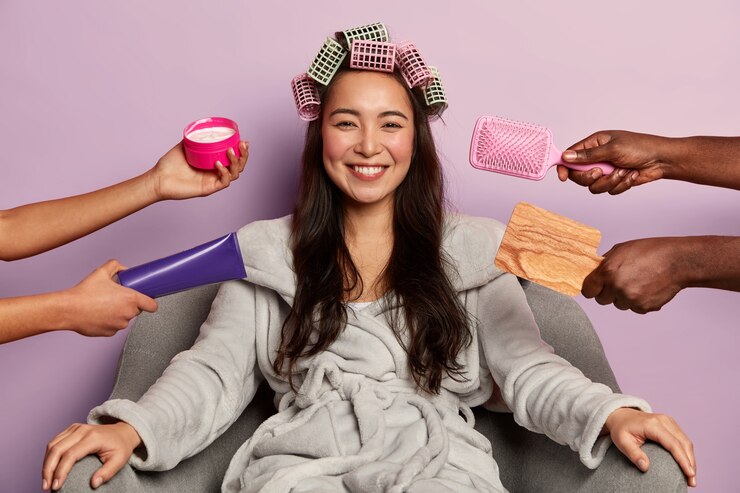Introduction to Hair Care
Hair care is an essential aspect of personal grooming and hygiene. Regardless of hair type, maintaining healthy and vibrant locks contributes to overall confidence and well-being. Understanding the unique characteristics of your hair type is fundamental to devising an effective hair care routine.
Understanding Different Hair Types
Straight Hair
Straight hair tends to be sleek and shiny but can also become oily quickly. It often lacks volume and may appear flat.
Wavy Hair
Wavy hair has gentle curves and offers more volume than straight hair. However, it can be prone to frizz and requires adequate moisture to maintain its shape.
Curly Hair
Curly hair forms tight, spiral curls or loose ringlets. It is susceptible to dryness and requires products that enhance definition while combating frizz.
Coily Hair
Coily hair has tightly coiled or kinky curls. It is prone to shrinkage and requires extensive moisture to maintain elasticity and prevent breakage.
Common Hair Care Challenges
Regardless of hair type, common challenges include dryness, frizz, split ends, and breakage. Implementing the right hair care practices can address these issues and promote healthier hair.
Hair Care Tips for Straight Hair
- Use a volumizing shampoo and conditioner to add body to your hair.
- Limit the use of heavy styling products to prevent weighing down your hair.
- Invest in a quality dry shampoo to manage oiliness between washes.
Hair Care Tips for Wavy Hair
- Embrace your natural waves by using a curl-enhancing mousse or gel.
- Avoid brushing your hair when dry to prevent disrupting the natural wave pattern.
- Deep condition regularly to maintain moisture and minimize frizz.
Hair Care Tips for Curly Hair
- Use sulfate-free shampoo to prevent stripping natural oils from your hair.
- Apply a leave-in conditioner or cream to define curls and combat dryness.
- Consider plopping or diffusing hair to enhance curl definition and minimize frizz.
Hair Care Tips for Coily Hair
- Use a wide-tooth comb or your fingers to detangle hair gently while wet.
- Apply a rich, moisturizing hair butter or oil to seal in moisture and promote shine.
- Protect hair at night by sleeping on a satin pillowcase or wearing a silk bonnet.
General Hair Care Tips
- Limit the use of heat styling tools to prevent heat damage and breakage.
- Protect hair from environmental stressors by wearing hats or scarves.
- Incorporate scalp massages to stimulate blood flow and promote hair growth.
Avoiding Common Mistakes
- Avoid overwashing hair, as it can strip away natural oils and lead to dryness.
- Refrain from using hot water when washing hair, as it can cause damage and frizz.
- Resist the urge to touch or manipulate hair excessively throughout the day.
DIY Hair Masks and Treatments
- Try a homemade avocado mask to nourish and hydrate dry hair.
- Use a coconut oil treatment to repair damaged hair and restore shine.
- Experiment with apple cider vinegar rinses to clarify and balance the scalp.
Importance of a Healthy Diet
- Incorporate nutrient-rich foods such as fruits, vegetables, and lean proteins into your diet.
- Stay hydrated by drinking plenty of water to promote overall hair health.
Incorporating Regular Trims
- Schedule regular trims every 6-8 weeks to prevent split ends and promote hair growth.
- Communicate with your stylist about your hair goals and preferences.
Choosing the Right Hair Products
- Read product labels carefully and opt for formulas free of sulfates, parabens, and silicones.
- Experiment with different brands and products to find what works best for your hair type.
Maintaining Hair Hydration
- Use a humidifier in dry environments to prevent hair from becoming brittle and dehydrated.
- Apply a lightweight oil or serum to seal moisture into the hair shaft.
Conclusion
Effective hair care is not one-size-fits-all and requires a tailored approach based on individual hair types and concerns. By understanding the unique characteristics of your hair and implementing targeted care routines, you can achieve healthy, lustrous locks that radiate confidence and vitality.
FAQs (Frequently Asked Questions)
- How often should I wash my hair?
- The frequency of hair washing depends on your hair type and lifestyle. Generally, it’s recommended to wash hair 2-3 times per week to prevent stripping natural oils.
- Can I brush curly hair?
- Curly hair should be brushed gently while wet using a wide-tooth comb or a specialized detangling brush to prevent breakage and maintain curl definition.
- Are natural hair care products better than conventional ones?
- Natural hair care products can be beneficial as they often contain fewer harsh chemicals. However, it’s essential to consider individual hair needs and preferences when selecting products.
- How can I combat frizz?
- To combat frizz, focus on moisturizing hair regularly, using anti-frizz styling products, and avoiding excessive heat styling.
- What should I do if I have oily roots and dry ends?
- If you have oily roots and dry ends, consider using a clarifying shampoo on the scalp and a hydrating conditioner on the ends to balance moisture levels.


